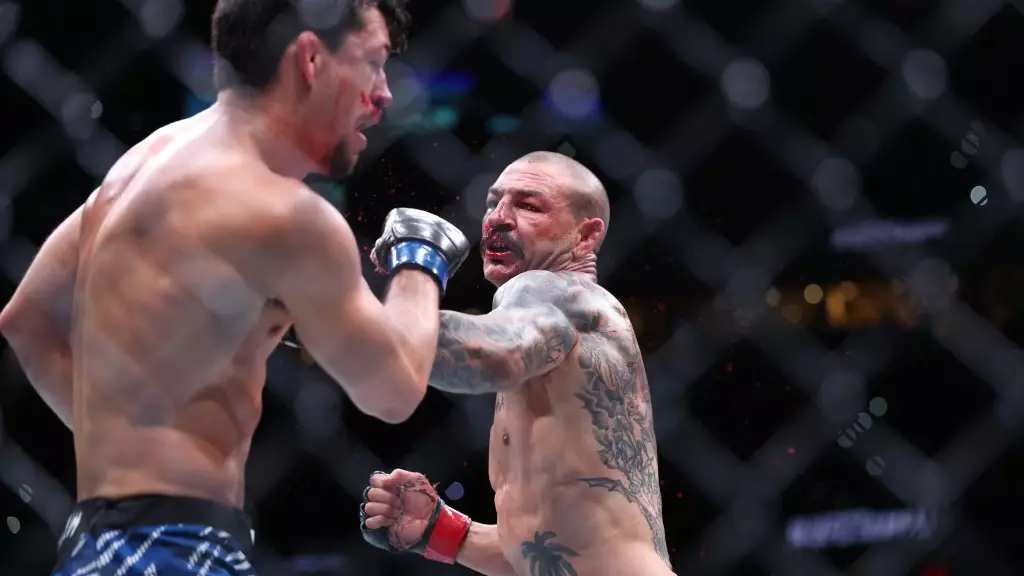Cub Swanson has long been a stalwart in the world of mixed martial arts (MMA), a fighter whose career spans nearly two decades. Following his recent knockout victory over Billy Quarantillo at UFC on ESPN 63, it appears that Swanson’s time in the octagon could be drawing to a close. The commentary from UFC personality Laura Sanko highlights the emotional weight of this transitional moment. It’s not just another fight in the career of an established athlete; it is a poignant crossroads that demands introspection and courage in deciding when to say goodbye.
Standing at the impressive record of 30 wins and 14 losses in MMA, Swanson’s experience transcends mere statistics. Having achieved notoriety as a record-holder in various categories within the UFC, he has undoubtedly cemented his legacy in the sport. Nevertheless, as Sanko indicated, the significance of his latest win raises important questions about retirement and the ideal way to conclude a storied career.
The aftermath of a fight can often be as noteworthy as the contest itself. When Swanson engaged with the media post-fight, the atmosphere was charged with emotion. Reflections on his career and what is left to accomplish poured forth, revealing a man who has navigated his way through personal struggles, heartbreak, and triumph. To many, this kind of introspection is an indication that one is contemplating retirement. A fighter delving into their past, recognizing their journey, serves as a sign that they might not be far from hanging up their gloves.
Swanson has not only fought for his place within the sport but also for personal redemption. His history as a troubled youth and how he transformed that narrative through dedication and discipline serve to elevate his story beyond the ring. MMA has provided him with opportunities not just for victories, but for personal growth and happiness, leading to a supportive family and a deep-rooted relationship with the sport.
When speaking about an athlete’s trajectory, highlights are meant to encapsulate their essence. Swanson’s high points—headlining major fights, dazzling opponents, and executing jaw-dropping finishes—are well documented. Yet, the question now is whether to leave the sport on a high note, with a breathtaking finish, rather than risk the uncertainties of further competition. The harsh reality of professional fighting is that one moment of vulnerability can reshape a career, leading to unforeseen setbacks and possible damage.
Laura Sanko poignantly suggested that Swanson should have made his retirement known immediately after sealing his knockout victory. The notion of symbolically placing his gloves down and officially announcing his retirement could have provided a fitting closure not just for him, but for the fans who idolized him. The idea that a fighter should exit at the pinnacle of their career, rather than in decline, offers a narrative that speaks to the emotional terrain of sports and its athletes.
Regardless of whether Swanson chooses to step away from the octagon, he will maintain a connection to the sport through his training endeavors and his management company. At 41, he’s already opened avenues for the next generation of fighters, demonstrating that his passion for MMA transcends personal glory. His expertise and experience may serve as invaluable resources for those following in his footsteps.
As the MMA community collectively holds its breath, speculating about Swanson’s next moves, it’s essential to remember that every fighter’s journey is their own. While Sanko hopes for a grand farewell in the octagon, the decision is ultimately Swanson’s alone to make. Whether he continues to compete or decides to retire, one thing is certain: his legacy in MMA is established, inspiring stories of resilience, triumph, and the relentless pursuit of excellence.
In a sport defined by uncertainty, farewell moments can sometimes be as electrifying as the fights themselves, capturing the heart and spirit of true competitors. The future remains unwritten for Cub Swanson, but his past is already monumental.

